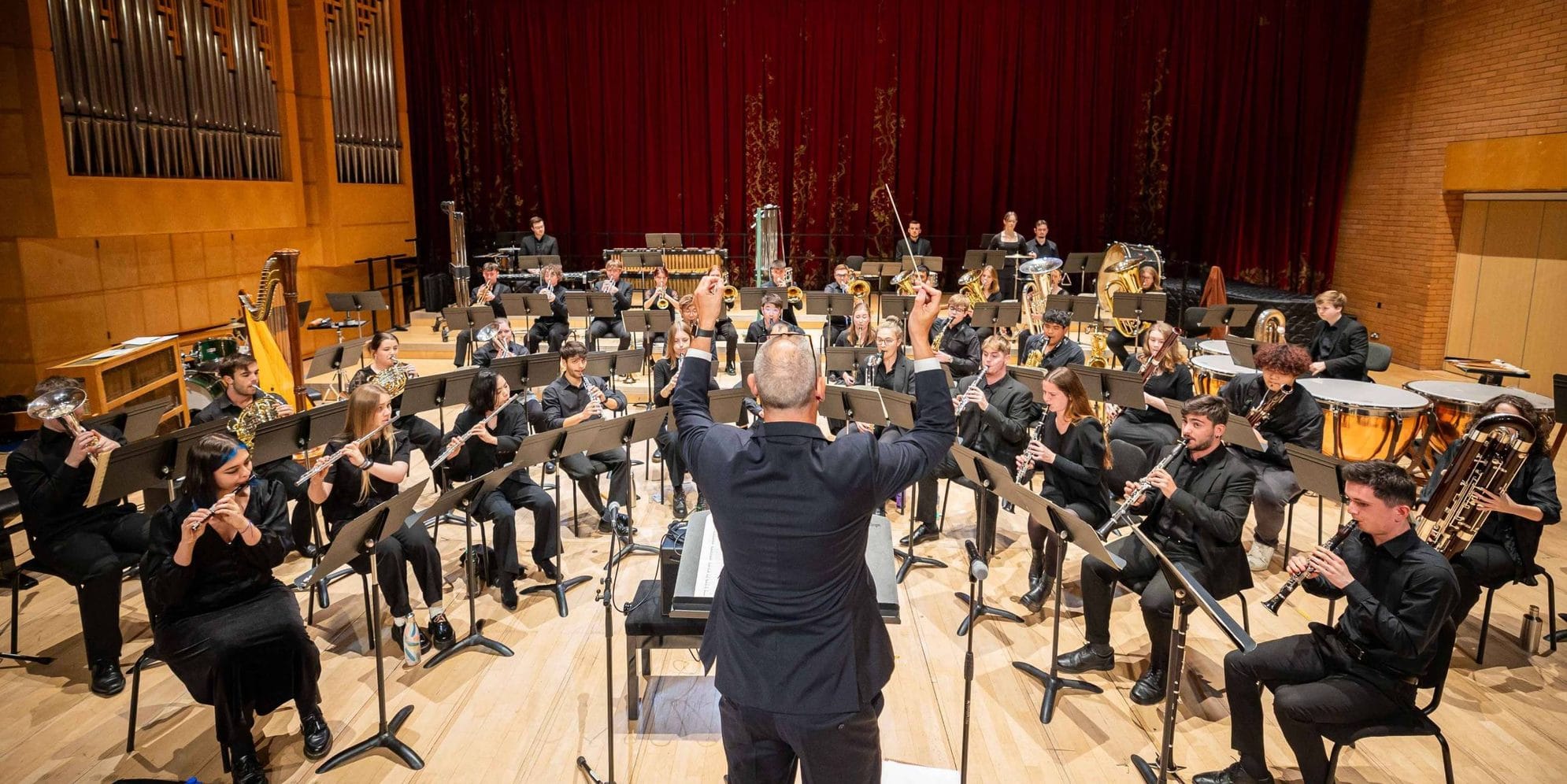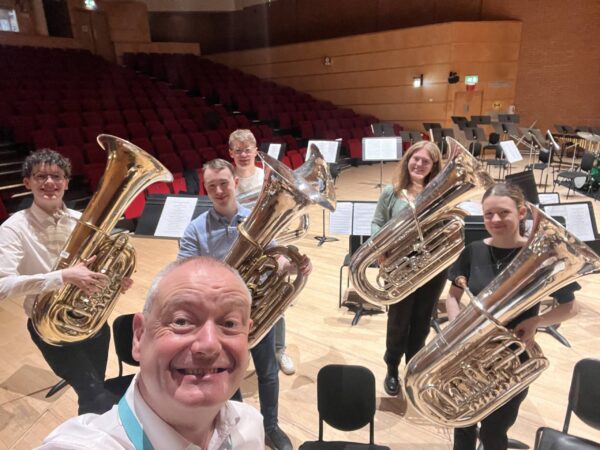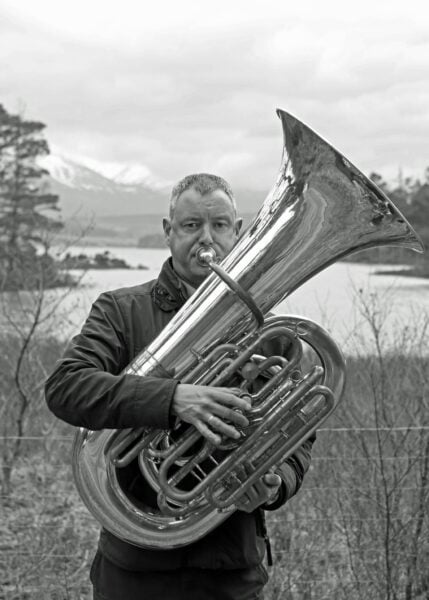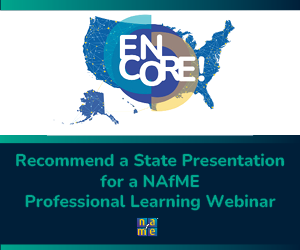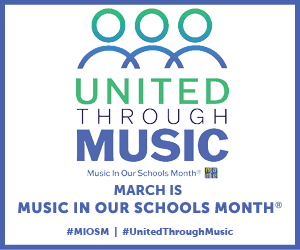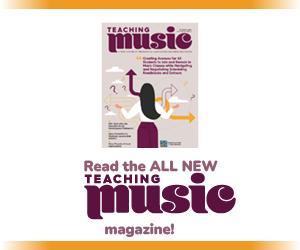/ News Posts / Q&A with Mark Reynolds, Brass Lecturer
Royal Conservatoire of Scotland Staff Spotlight
Q&A with Mark Reynolds, Brass Lecturer
This blog is sponsored by NAfME Corporate member Royal Conservatoire of Scotland (RCS). This article first appeared on the RCS site here.
From the Junior Conservatoire to undergraduate studies and now Royal Conservatoire of Scotland (RCS) Brass lecturer, tuba player Mark Reynolds goes under the spotlight in our staff Q&A. Read more to find out his top tips for those considering pursuing Music study at degree level and a typical day as a Brass lecturer at a World Top 10 Performing Arts institution.
Mark Reynolds has been a Brass lecturer at RCS since July 2023.
What drew you to the Royal Conservatoire of Scotland?
The opportunity to work with the excellent students and staff of the Brass department as well as the other wonderful teams within RCS.
I now split my week between working for the High Life Highland Music Instruction team in Fort William in the Highlands and RCS, so I have a lovely blend of working with Primary 5 students all the way up to Masters level!
What do you enjoy most about your role?
Observing the progression of students on a weekly basis, as well as challenging myself in all the new roles I have, whether it be as conductor of the wind orchestra, as a teaching musician lecturer, delivering lectures on brass pedagogy or conducting the Con Brass 2 ensembles or indeed getting to know and mentoring every student that I work with.
Describe a typical day.
My days at RCS actually start the night before, when after I teach at Lochaber High School and conduct our excellent senior band, I then drive home and have about 45 minutes there before jumping on the train from Spean Bridge down to Queen Street, where I get to my lodgings at about 10pm. Then back home after working at RCS on a Friday at about 10pm. So, long but very rewarding days!
Thursdays at RCS are pretty full-on! We start with an 8:45 – 10am woodwind and brass repertoire class where we look at an orchestral work and get to dive into it in real detail.
This class is an excellent opportunity for the students to have rehearsed orchestral repertoire before being potentially exposed to it in a professional capacity.
I then take a low brass repertoire class, where again, we study an orchestral work but this time just with a standard orchestral lower brass section. Here we can get into all aspects of section playing, from intonation and articulation to style and blend. A highly enjoyable class!
Then I run my ‘MR Coach’ class—this is a session where students, who have formed their own ensembles, can come to me with material that they have been working on and receive coaching and feedback on their work, as well giving me the opportunity to provide them with ideas to continue their deep dive into chamber music in all its forms.
Then it’s normally a catch-up lunch with John Logan, Head of Brass. As I am only part-time, these meetings are an essential way of having personal contact with John and discussing an enormous range of topics from student welfare to potential performance opportunities for our students.
The afternoon kicks off with woodwind and brass performance class. I really enjoy these classes as it allows me to not only hear the brass players perform but it also is a great chance for me to get to know and listen to the Woodwind students with whom we work so often and so well together.
The day normally finishes with teaching my individual students, whether on their full-time instruments or indeed their APS choices such as F or CC tuba.
What sparked your love of the arts?
When I was about 14, I saw and heard the tuba for the first time and then was exposed to amazing musicians who happened to be brass players telling wonderful stories through their instruments, so for me it was the realisation that art in all its different forms, shapes and sizes can tell you wonderful tales and, importantly, everyone and every day is different.
What do you recall about your own training?
I was lucky enough to actually study here at the then-RSAMD (Royal Scottish Academy of Music & Drama) at both Junior and Senior school levels. I learned invaluable skills in ensemble and orchestral playing as well as excellent lessons in professionalism and preparation, which I hope I can pass onto my students of all levels.
My postgraduate studies took me to Munich and then on to a career in the professional orchestral and ensemble spheres, so these experiences have forged my approach to performance and pedagogy.
What advice would you give your younger self?
To think more about efficiency in all aspects of my practice and daily routines, listen properly to my teachers, and be curious at all times. I would also have encouraged myself to take singing lessons. The more I teach and learn myself, the more I realise how important singing and aural training is for us wind players.
Who influenced you?
My initial teachers such as Jim Park, Willie Young (who I still think has the finest articulation of any tuba player I know), Philip Hore, and Tony Swainson. After heading to Europe, I was immersed in the brass playing of the Munich Philharmonic, so Bob Ross and Tom Walsh played a huge influence on my career development.
I also helped form the WorldBrass Ensemble, and the members there inspire me daily, but the tuba player John Fletcher, for me, has one of the clearest forms of storytelling in any musician I have ever heard—I understand his stories very clearly and enjoy them to this day.
I am also constantly inspired by the incredible work our instrumental teachers do here in Scotland with our young musicians. Their positivity, educational skills, and flexibility are truly remarkable, and they often don’t get the credit they deserve!
Career highlights?
Playing Rite of Spring with the Munich Philharmonic; the WorldBrass recordings; playing the Vaughan Williams Tuba Concerto with the Antwerp Symphony Orchestra after being offered the position as principal tuba; competition success with the Lochaber High School Senior Wind Band and Highland Youth Wind Band; being awarded the travelling scholarship to the MidWest Band and Orchestra Clinic from the Scottish Concert Band Festival; the creation of the Inverlochy Primary School Band Class project along with my colleague Karen Thomson; joining the RCS teaching team and hopefully making people’s lives just a little bit better through music and education!
Your most memorable RCS moment?
In my current role, stepping into the Stevenson Hall conducting the wind orchestra in the concert to the memory of Nigel Boddice—a real honour and the band played excellently.
Describe RCS in three words?
Inspiring, intense and family.
What would you stay to those considering studying here?
Living and learning here in Glasgow is an experience which you will never forget. The teaching staff are exceptionally knowledgeable and encouraging, and the students will support you in all aspects of your studies.
You will receive tuition from the finest performers and educators in the country and will have ensemble and performance opportunities from day one.
If your students wish to find out more about studying Music at the Royal Conservatoire of Scotland, then they can visit rcs.ac.uk/music. Applications are currently open for September 2026 entry, and auditions are taking place in the United States in January 2026. Please visit our website for full details.
Did this blog spur new ideas for your music program? Share them on Connect! Interested in reprinting this article? Please review the reprint guidelines.
The National Association for Music Education (NAfME) provides a number of forums for the sharing of information and opinion, including blogs and postings on our website, articles and columns in our magazines and journals, and postings to our Connect member portal. Unless specifically noted, the views expressed in these media do not necessarily represent the policy or views of the Association, its officers, or its employees.
Published Date
September 30, 2025
Category
- Careers
- Collegiate
- Ensembles
- Lifelong Learning
- Music Education Profession
Copyright
September 30, 2025. © National Association for Music Education (NAfME.org)
